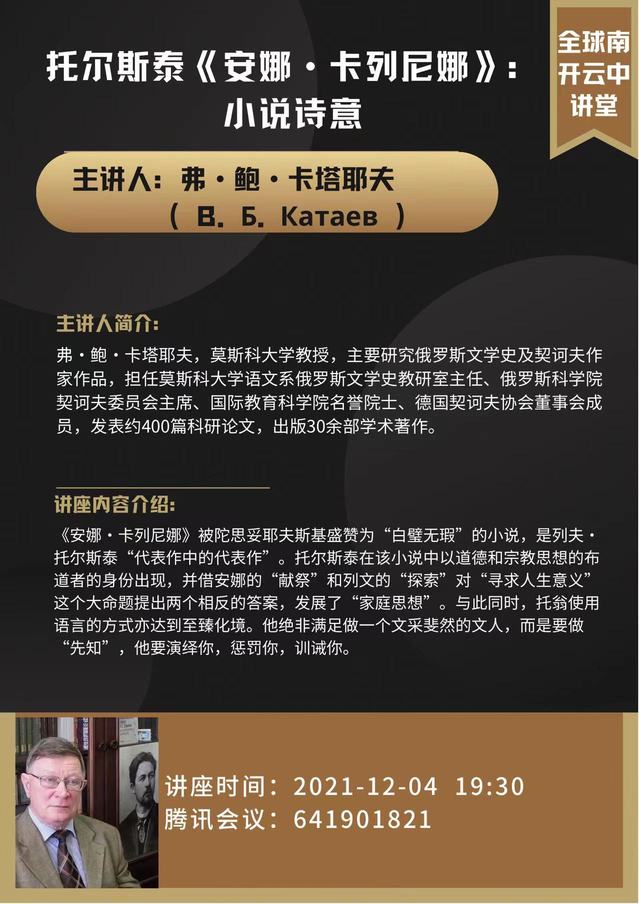
On the evening of December 4th and December 11th, Professor F. Bo Katayev of Moscow University was invited by the College of Foreign Languages of Nankai University to give two lectures for the teachers and students of Nankai University and the researchers of Russian literature. He gave two online lectures entitled “Leo Tolstoy’s Anna Karenina: The Poetic Flavor of Novels” and “The Decryption of Chekhov’s Cherry Orchard”. Professor Wang Lidan of the College of Foreign Languages of Nankai University hosted the two lectures.
Professor V. B. Katayev (В. Б. Катаев) is a Ph.D. from Moscow University. He is the Director of the History of Russian Literature in the Department of Languages of Moscow University, Chairman of the Chekhov Committee of the Russian Academy of Sciences, Honorary Academician of the International Academy of Educational Sciences, and Member of the Board of Directors of Chekhov Association of Germany. He has published about 400 scientific research papers and more than 30 academic works.
The theme of the first lecture was “Leo Tolstoy’s Anna Karenina: The Poetic Flavor of Novels”. Professor Katayev first introduced the unique position of Anna Karenina in Tolstoy’s overall career and the film and television adaptations of the novel in various countries in the world. Then, he explained the novel from four aspects: the sacrifice of the characters, the dialogue between the characters and God, the artistic technique of the novel, and the family thought of the novel. Firstly, the sacrifice of the characters is mainly achieved by Anna’s throwing of herself under a train, which indicates the loss of oneself in lust. Secondly, Professor Katayev emphasized that both Anna and Levin are in dialogue with God, but the difference is that Anna loses herself in the process, while Levin finds the true meaning of life in the exploration of the soul and in approaching the peasants. Thirdly, Professor Katayev analyzed the unique rhythm and artistic technique of the novel, and pointed out that Tolstoy was a very skillful writer with stylistic features. Fourthly, about the family thought in the novel, Professor Katayev explained that the three families in the work, if being interpreted from comparison of relevant plots and the perspectives of different family members, entail rich themes and ideological connotations. It is particularly worth noting that Tolstoy gave Levin many personal characteristics. Levin’s painful thinking process is a reflection of Tolstoy’s intense moral and religious exploration.
The theme of the second lecture was “The Decryption of Chekhov’s Cherry Orchard”. Professor Katayev made an in-depth interpretation of the dramatic innovation and eternal artistic charm of Chekhov’s play Cherry Orchard. Firstly, he pointed out that the dialogues in Cherry Orchard were unordered. To be specific, the people in the play didn’t seem to hear each other; and even though they did, they would give inappropriate answers. This dialogue structure reveals people’s state of being in terms of isolation, self-narcissism, and inability to listen to others. Secondly, he explained the uniqueness of Chekhov’s dramatic conflicts, pointing out that Chekhov rejected external plots: the play is full of the trivialities of daily life, seemingly incoherent dialogues, and irrelevant details, which are all related to emotions. Therefore, Professor Katayev believes that Chekhov’s drama unfolds itself not from plot to plot, but from emotion to emotion, just like music without plot. Furthermore, Professor Katayev clarified the characteristic of “undercurrent” of Cherry Orchard and gave hints of understanding in the text, which left readers with plenty of room for imagination. Finally, Professor Katayev drew on the nature of repeatability and the monologue-featured dialogue of the play. On the one hand, Chekhov applied a repetitive phrase in a different way to almost every character in the play. Repetition (giving everyone the same characteristics) is the most powerful means of expressing the playwright’s thoughts and explaining his ideas about people and the play. On the other hand, paralleling to the repetitive theme is another seemingly contradictory one, that is, people, as if they were frozen in the play, talk from time to time about how much life has changed and their hopes and dreams. This technique makes in high proportion dialogues with features of monologic or fictional.
In short, people in Cherry Orchard are obsessed with their own positions and truths, and do not pay attention to their similarities with others. For Chekhov, this seems to be the common destiny of mankind and an irreplaceable feature of human existence. Indeed, the interaction of various truths, thoughts, and actions is the subject of Chekhov’s research. In this “Song of the Swan”, Chekhov recorded the Russian society which was just one step away from the general breakdown when people only listen to themselves and to the final disintegration and widespread hostility. He urged not to deceive oneself with one’s own views on the truth, not to absolutize “truths” which are actually “wrong ideas”, and emphasized everyone’s responsibility for the general process of things. It can be said that in Chekhov’s depiction of Russian historical issues, people have seen problems that are closely related to everyone at any time and in any society.
Katayev’s two lectures were detailed in content, fresh in research perspective, and hearty in feeling. In the Q&A session of the two lectures, Professor Katayev commented on the inscription and the contemporary interpretation of the characters of the novel Anna Karenina. He gave detailed answers with enthusiasm to questions about Chekhov’s short stories, the relationship between Chekhov and Gorky, between Chekhov and Turgenev, and between Chekhov as a playwright and as a novelist. In the warm feedback from the participants, Professor Katayev especially thanked Professor Wang Lidan and the College of Foreign Languages, and looked forward to more academic exchanges with teachers and students of Nankai University in the future.



